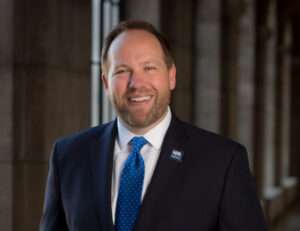
By CINDY GONZALEZ
Nebraska Examiner
As Nebraska combats a triple threat — that is, a recent surge in cases of COVID-19, RSV and influenza — experts from competing hospitals joined forces Monday to advise ways to head off a bigger crisis.
Four medical professionals said in a news conference that each of their respective hospital systems remains open for business and continues to treat sick people. But they warned that additional stress, on top of ongoing labor shortages, could hurt patient care and further overwhelm emergency rooms.
“Our hospitals are entering a very challenging time, and quite frankly, we need Nebraskans to help us with it,” said Jeremy Nordquist, president of the Nebraska Hospital Association, which represents 92 hospitals. “It’s pretty stark when you look at the numbers.”
How Nebraskans can help
He said that according to data from the Nebraska Department of Health and Human Services, the number of COVID-related emergency room visits is close to what it was last year at this time, and, he noted, that was at the peak of the Omicron variant.
With influenza, Nordquist said, Nebraskans entered the season this year earlier and with higher counts than a year ago. “Probably about three times the rate of influenza cases coming into our emergency rooms,” he said.
Cases of respiratory syncytial virus (RSV), he said, are about three or four times higher than at the same point last year, though, he said, they are starting to drop a bit.
Hospital association leaders have been talking for weeks with medical institutions, experts and elected officials about capacity troubles, Nordquist said. Hospitals can’t solve the “crisis” on their own, he added, and that’s why medical experts came together to share thoughts on how Nebraskans can help.
Among common themes: Those feeling ill should try to contact their primary care doctor or health care provider before heading to an emergency room.
Dr. Cary Ward, chief medical officer at CHI Health in Omaha, noted multiple ways a person can be treated, including via virtual health care. He said a lengthy ER visit might not be the best method for treating what might be a minor illness.
Said Dr. Harris Frankel, chief medical officer with Nebraska Medicine: “We want people to access care at the right time, in the right place, for the right reason.”
Vaccines urged
Frankel and his colleagues urged people to get vaccinated to help combat viruses and hospital stays.
“This year’s influenza vaccine appears to be a pretty good match for the virus,” Frankel said, calling vaccines the best form of protection.
Dr. Kari Simonsen, chair of pediatrics for Children’s Hospital & Medical Center, also talked of a “tried and true” preventative measure that’s especially relevant heading into a holiday season: Stay home if you’re sick.
She said some good news is that Nebraska’s RSV surge appears to have peaked and may be starting on a downward trend.
“Influenza, on the other hand, still seems to be really on an upward trajectory that doesn’t have an end in sight for us yet.”
Responding to the increase in pediatric illness, Simonsen said specialized hospitals are meeting with each other at least weekly to understand “pain points” and concerns related to the rise in admissions.
Dr. John Trapp, chief medical officer at Bryan Medical Center in Lincoln, said he was concerned about the number of pediatric cases and underscored ongoing staffing challenges at hospitals.
“Our workforce remains tired,” he said. “They’ve been through a long number of years.”
Competition aside
Bryan still uses traveling health care professionals to help fill voids, Trapp said. And while the travelers play a significant role in patient care, he said they also come at a higher expense.
“It does impact hospitals with regard to financial strength and what we can do and what additional investments we can make into our community,” Trapp said.
Frankel noted the competitive nature of the hospitals represented at the news conference, but said they united Monday, and have since the pandemic, for community and patients.
“Though we are competitors, we’ve all believed from the get-go, that as a community and for the patients we serve, we are much better together.”




